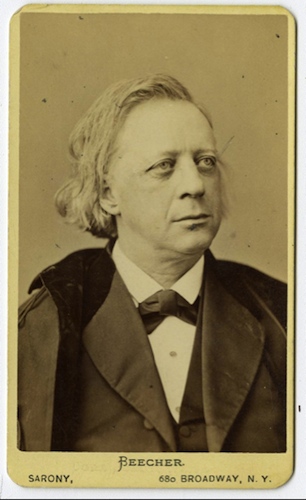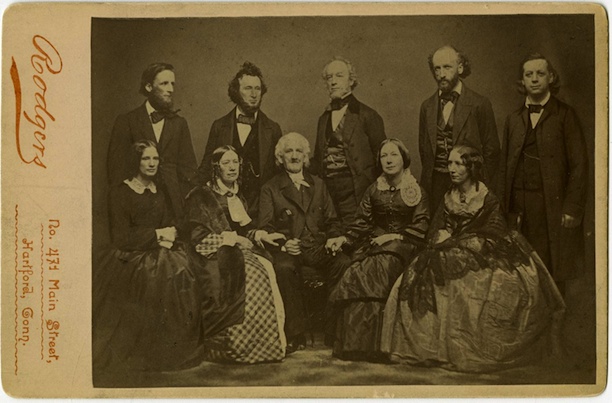By Karen DePauw
The story reads like a soap opera. In 1870, Theodore Tilton accused his wife of being unfaithful to him with the popular preacher Henry Ward Beecher, and Elizabeth Tilton confessed. After her confession, she spoke with the Reverend Beecher and said that she hoped the confession would help to mend her relationship with her husband by restoring trust. Beecher implored her to take back her confession and restore his good name. Elizabeth retracted her confession, but after speaking with her husband a second time, she retracted her retraction the very same night. The scandal continued as Tilton claimed Beecher had confessed to him at the home of a mutual friend. A decision was made to cover up the scandal for the sake of everyone’s reputations. The cover-up, however, was shaky at best, and Tilton continued to talk about his wife and the Reverend Beecher to friends who further spread the gossip.

Henry Ward Beecher. Photograph by Napoleon Sarony, ca. 1870s – Connecticut Historical Society
Until 1872, the matter was largely a private one, whispered about in parlors. However, on November 2, 1872, Victoria Woodhull set in motion the public debate when she penned an editorial implicating Beecher’s guilt, while pushing forward her own agenda: the acceptance of “free love.”
A church committee investigated the scandal and exonerated Beecher of the charges. Then, in 1874 another committee began another investigation during which Elizabeth asserted that Beecher had never made physical advances towards her. Finally, in 1875, a civil suit between Tilton and Beecher was followed by a string of additional suits suing just about everyone involved for libeling someone else involved in the scandal. Six months later, after eight hours of debate, the jury was unable to come to a verdict and the case was dismissed.
Although the drama played out in Brooklyn, New York, where Beecher was the pastor of the Plymouth Congregational Church, and aroused great interest nationwide, it was of special concern in Hartford, where Beecher’s sisters, Catharine Beecher, Isabella Beecher Hooker, Mary Beecher Perkins, and Harriet Beecher Stowe, were all prominent and well-respected citizens. The scandal inspired numerous cartoons and caricatures, newspaper and magazine articles, and has even been the subject of scholarly study. A one-act play written in 1874 soon after the scandal erupted is in the collections of the Connecticut Historical Society and may be viewed by visiting the Waterman Research Center there.
Karen DePauw formerly a Research and Collections Associate at The Connecticut Historical Society.
© Connecticut Public Broadcasting Network and Connecticut Historical Society. All rights reserved. This article originally appeared on Connecticut History | WNPR News
Note: ConnecticutHistory.org does not edit content originally published on another platform and therefore does not update any instances of outdated content or language.









